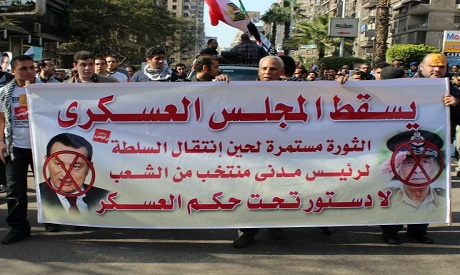 With only two days to go before Egypt's first post-Mubarak presidential election on Wednesday and Thursday, the ruling Supreme Council of the Armed Forces (SCAF) appears set to issue an interim constitution. The move comes after parliament failed to form a constituent assembly mandated with writing Egypt's first post-revolution national charter.
With only two days to go before Egypt's first post-Mubarak presidential election on Wednesday and Thursday, the ruling Supreme Council of the Armed Forces (SCAF) appears set to issue an interim constitution. The move comes after parliament failed to form a constituent assembly mandated with writing Egypt's first post-revolution national charter.
Egypt's Islamist-led parliament has come under fire from secular forces for allegedly exploiting its majority in the People's Assembly (the lower house of Egypt's parliament) to impose its own views on the new constitution.
Secular forces have urged the SCAF to amend Article 60 of the constitutional declaration (issued by the SCAF after last year's revolution and approved via popular referendum) with the aim of stripping parliament of the right to appoint constituent assembly members and entrusting the constitution-drafting process to a handful of law professors.
According to recent reports, the SCAF has warned parliament that, unless the constituent assembly is formed by 20 May, it would intervene by issuing an 'interim constitution' to be annexed to last year's constitutional declaration. The proposed interim constitution will reportedly grant Egypt's newly elected president the right to dissolve parliament and appoint the prosecutor-general, along with Al-Azhar's grand imam and grand Mufti.
The proposed interim constitution also reportedly stipulates that the state shall represent the only body authorised to form and maintain the armed forces, stressing that the role of Egypt's military is to safeguard national security, maintain national unity and protect the constitution and the revolution's legitimacy.
In addition, the interim constitution will reportedly grant the SCAF absolute powers to discuss and review the military's internal affairs, including its budget, armaments and military law. The budget can be discussed by parliament's defence and national security committee, according to the provisional constitution, but only in secret closed-door meetings.
Moreover, the interim charter states that the president represents the commander-in-chief of Egypt's armed forces, while the defence minister is described as the 'general leader' of the military. The president is authorised to declare war, according to the proposed charter, but only with the approval of the SCAF and the People's Assembly.
As an ostensible check on the powers of the president and the military, the interim constitution is expected to grant the People's Assembly the power to form a government (with the exception of the defence, interior, military production, foreign affairs, information, finance and justice portfolios). The charter also reportedly grants the assembly the right to withdraw confidence from the incumbent government.
Some analysts believe that the powers granted to the military in the new interim constitution are a necessary evil to prevent Islamist forces – especially the Muslim Brotherhood, which now controls almost half the seats in parliament – from becoming a state within a state. But many political observers also voice concern that the proposed interim constitution would similarly maintain Egypt's military as a state unto itself.
Many analysts have warned that a Brotherhood-affiliated president could move to tighten the Islamist group's grip on the military, turning it into a private militia like Lebanon's Hezbollah.
"In this case, Egypt could become like Iran; it could come under the indirect rule of the Brotherhood's supreme guide and turn the army into a tool for its own Islamist goals," leftist analyst Mohamed El-Sayed Selim told Ahram Online. "Brotherhood leaders have not kept it a secret in recent days that the supreme guide is the group's main decision maker and that all must obey his orders."
According to Selim, the Brotherhood has exploited its parliamentary majority to issue laws serving its own interests – such as a recent disenfranchisement law, barring remnants of the former regime from participating in political life – and it could do the same with the army if its candidate wins the presidential election.
Selim went on to say that the Brotherhood, along with other Islamist forces, had tried to impose its will on Egypt's Supreme Constitutional Court (SCC) and manipulate it for its own interests.
Selim, like many other leftists, believes Egypt's new constitution should give the army absolute immunity against intervention by Islamist forces should the latter assume power. "It's also necessary to give the armed forces the final say on declarations of war as a guarantee against Egypt entering religious wars," said Selim.
Several presidential candidates have declared in recent days that, until a final constitution is written, the newly elected president must be given authority to dissolve parliament. The leadership of the Muslim Brotherhood, meanwhile, remains divided on this point.
Some believe this power could be used to dissolve the existing Islamist-led parliament, especially given that the SCC is currently reviewing Egypt's elections law, which could be ruled unconstitutional and lead to the assembly's dissolution. Others, however, play down this possibility, believing that Brotherhood presidential candidate Mohamed Mursi will win the election.
In general, Muslim Brotherhood leaders have said that they would not object to a SCAF-issued interim constitution as an annex to last year's constitutional declaration. "We aren't against issuing a complementary constitution if it deals solely with the new president's prerogatives and responsibilities," Senior Muslim Brother and chairman of parliament's foreign affairs committee Essam El-Erian said.
"Article 56 of the existing constitutional declaration gives very few powers to the new president and speaks little about his relationship with the legislative and judicial branches," El-Arian added. "So it's necessary for an annex to include more details about these powers and duties until a new constitution can be written."



